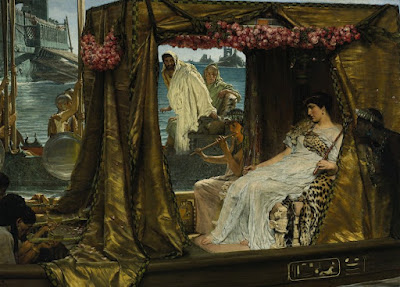Antony and Cleopatra tells the story of Mark Antony, one of the three rulers (Second Triumvirate, 43-33 BCE) of the late Roman Republic, who begins an affair with Cleopatra, the Queen of Egypt, and is caught between desire and duty. The major antagonist for both of them is Octavius Caesar, one of Antony's fellow triumviri and the future first emperor of Rome. Shakespeare used the Lives of Plutarch as his major source, even quoting literally from the English translation.

[Cleopatra by John William Waterhouse (1888)]
Before turning to the play, I read the Life of Antony, and so recalled why many of the Latin texts I translated in Grammar School were so boring: it is nothing but war and fighting - in every paragraph a different war, be it an uprising, a border war, a rebellion or a conquest of new territory. And the fighting continues inside Rome where the politicians are continually at each other's throats. Losers are executed, so politics is a job with a high death-rate, in fact comparable to the wars fought by the generals.
This brush with my own past, reminded me of the fact that my knowledge of ancient history had gotten rather dusty, so I turned to Wikipedia for an update on the two protagonists.
Cleopatra is by far the most interesting character of the two - Mark Antony was a rather flawed person: a good professional soldier, who in the field shared various hardships with his men, but who away from the battle field was a boozer and womanizer, and unable to discipline himself. He married twice, with women wiser than he was, but these were political marriages that probably didn't really interest him. And then comes Cleopatra...

[Lawrence Alma-Tadema- Anthony and Cleopatra]
That is all from history, in which I interpret Cleopatra as a great politician. She was hungry for power and got what she wanted, for almost two decades - keeping Egypt independent. Antony I see as a typical soldier, weak in politics and on top of that, unable to keep himself in check at decisive moments in his life. He was too much heart and too little head. (It is unimaginable that the historical Cleopatra loved such a man - she rather used him -, and her suicide therefore must have been out of spite that she had lost her crown, rather than a love suicide.)
Now back to Shakespeare. Antony and Cleopatra is a complex historical play built on opposition. Throughout the play, the following oppositions are emphasized, subverted, and commented on:
- Between the protagonists, Antony and Cleopatra, who struggle to have power over each other.
Manipulation and the quest for power are very prominent themes in the relationship between Antony and Cleopatra. Both use language to undermine the power of the other and to heighten their own sense of power. Cleopatra dominates Anthony by making herself "difficult to get." She also pesters him about his wife (without giving him a chance to say something back) to make him feel guilty towards her. - Between masculinity and femininity
These are attributes of respectively, Antony and Cleopatra, and of Rome and Egypt. However, as has been seen by more critical readings in the 20th c., gender expectations are also converted: Antony is feminine, especially compared to Octavius, and Cleopatra is masculine in her expert play for power and independence from Rome. - Between pragmatic, austere Rome and sensual, imaginative Egypt (Alexandria)
Rome has been characterized as a male world, presided over by the austere Caesar, and Egypt as a female domain, embodied by a Cleopatra who is seen to be as abundant and changeable as the Nile - Between reason and emotion
This contrast is especially seen between Octavius Caesar, who is cold and rational, and Antony, who is all heart, all emotion. Octavius is disciplined, while Antony can't keep himself in check.

[The Death of Cleopatra by Reginald Arthur (1892)]
"Age cannot wither her, nor custom stale / Her infinite variety: other women cloy / The appetites they feed, but she makes hungry / Where most she satisfies."She is frequently vain and histrionic, - the first act almost reads like a comic quarrel between two not-so-young, jaded lovers. But at the same time, Shakespeare's efforts invest both her and Antony with tragic grandeur. By the way, Cleopatra is the most important character of the two - she gets a whole act more in the play after the death of Antony. In contemporary criticism she is seen as a character that confuses or deconstructs gender rather than as a character that embodies the feminine. In her relationship with Antony, Cleopatra even takes on the role of male aggressor.
"He fishes, drinks, and wastes / The lamps of night in revel; is not more man-like / Than Cleopatra; nor the queen of Ptolemy / More womanly than he; hardly gave audience, or / Vouchsafed to think he had partners: you shall find there / A man who is the abstract of all faults / That all men follow."In the past, this was wrongly interpreted in a sexist way: the great manly soldier has been incapacitated by a bad woman. He has been caught in "the trap of the East." Rather, as in modern re-interpretations of Cleopatra, we should see Antony as the Roman soldier characterized by a certain effeminacy, in other words, here, too, gender is confused.
Resources:
Text of the play
Librivox recording
Plutarch's Life of Antony
Article by Joyce Carol Oates